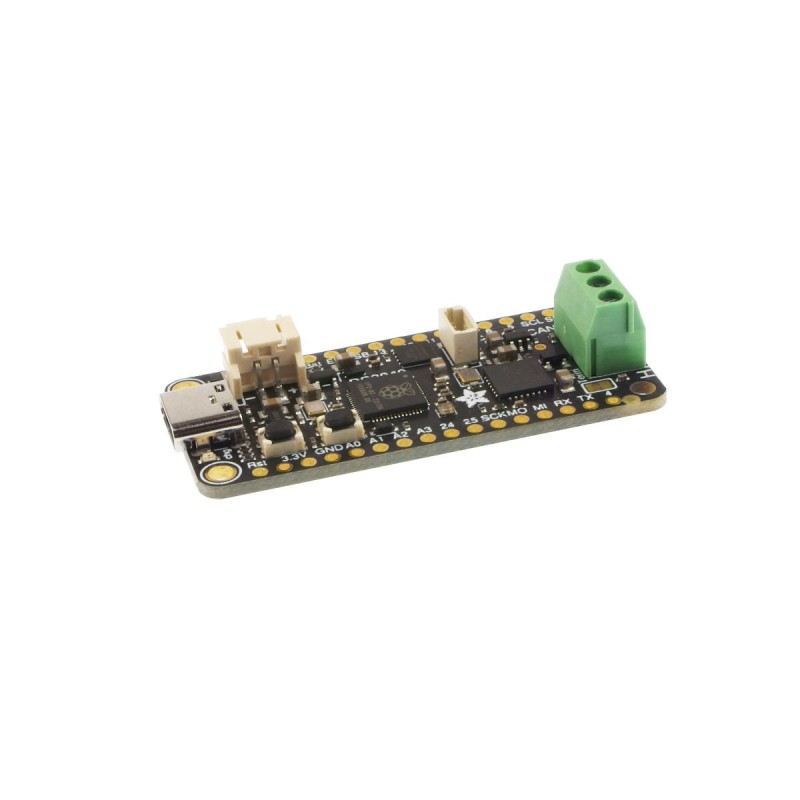







zł76.38 tax excl.
Board with RP2040 microcontroller and MCP2515 CAN controller. It has a built-in LiPo charging circuit and a STEMMA QT connector. It allows you to add communication based on the CAN bus to the project, commonly used in projects related to robotics and the automotive industry. Adafruit 5724
Feather RP2040 is a board equipped with the RP2040 microcontroller designed by the Raspberry Pi Foundation. The system has two ARM Cortex M0+ cores operating at a frequency of up to 133 MHz and 264 kB of RAM. The microcontroller is not equipped with flash memory, but on the board there is an external memory with a capacity of 8 MB connected via the QSPI interface.
On the board, apart from the RP2040 system and Flash memory, the user will find a 3.3 V voltage stabilizer, Boot and Reset buttons, LEDs and RGB NeoPixel, USB type C connector for powering and programming the module and 21 GPIO outputs on which such peripherals were derived such as four 12-bit ADC inputs, 16 PWM outputs, two I2C, SPI and UART interfaces. Additional sensors can be easily connected via the STEMMA QT connector and the I2C interface.
An important element of the board is the CAN MCP2515 controller with the SPI interface. CAN (Controller Area Network) is a communication protocol used mainly in industry, automotive and other applications where reliable and fast communication between devices is required. The CAN protocol allows data transmission speeds of up to 1 Mbps and is often used in systems where time synchronization and high reliability are required.
The platform supports the popular MicroPython and C/C++ programming languages. Programs can be uploaded to the memory via the USB interface using the built-in bootloader. Full documentation is available on the product page.
Data sheet
Manufacturer BTC Korporacja sp. z o. o. Lwowska 5 05-120 Legionowo Poland sprzedaz@kamami.pl 22 767 36 20
Responsible person BTC Korporacja sp. z o. o. Lwowska 5 05-120 Legionowo Poland sprzedaz@kamami.pl 22 767 36 20
Cable with USB type A and USB type C plugs, length 1m, white
No product available!
Cable with USB type A and USB type C plugs, length 2m, white
No product available!
The board with the RP2040 microcontroller equipped with two ARM Cortex-M0+ cores, which work at a frequency of 133 MHz, 264 kB RAM. The board also has 2 MB of QSPI flash memory. The system can be programmed in C/C++ or MicroPython. Waveshare RP2040-LCD-0.96-M
The board with the RP2040 microcontroller equipped with two ARM Cortex-M0 + 133 MHz cores, 264 kB RAM. The board also has 8 MB of QSPI flash memory. The circuit can be programmed in C/C++, CircuitPython or MicroPython. Adafruit 5302
Mini board with RP2040 microcontroller equipped with two ARM Cortex-M0 + 133 MHz cores, 264 kB RAM. The board also has 8 MB of QSPI flash memory. The circuit can be programmed in C/C++, CircuitPython or MicroPython. Pimoroni SP011
No product available!
Board with RP2040 microcontroller and W5100S network chip. The module is equipped with an Ethernet connector. WIZnet W5100S-EVB-Pico
Development board equipped with RP2040 microcontroller, RGB LED diodes, buzzer and Qwiic/STEMMA QT connectors. Pin spacing compatible with Arduino Nano. Cytron MAKER-NANO-RP2040
The board with the RP2040 microcontroller equipped with two ARM Cortex-M0+ cores. The board also has 4 MB of QSPI flash memory. 1.14" LCD module. TTGO T-Display RP2040
Module with ePaper 2.9" display and RP2040 microcontroller. Equipped with QW/ST connector. Pimoroni PIM607
Module with ePaper 2.9" display and RP2040 microcontroller. Equipped with QW/ST connector. Accessories included. Pimoroni PIM610
Development board with RP2040 microcontroller. Equipped with a microBUS connector, it can work with Qwiic expansion boards. SprakFun DEV-18721
Servo driver based on the Raspberry Pi RP2040 microcontroller. It allows you to control up to 18 servos, has 6 analog inputs and a QW/ST connector for connecting additional sensors. Pimoroni PIM613
Development board with RP2040 and ESP-12E microcontroller. Equipped with 0.91" OLED display. SB Components 24186
The board with the RP2040 microcontroller, which provides a set of 2x20-pin connectors to which you can connect the HATs of the Raspberry Pi. SB Components 24032
Module with round 1.28" IPS LCD display and 240x240 px resolution and RP2040 chip. SB Components 24018
Module with the RP2040 microcontroller with two ARM Cortex-M0 + cores operating at 133 MHz, 256 kB RAM and 30 GPIO. The board also has 2 MB of external QSPI flash memory. Module can be programmed in C/C++ or microPython. Version with soldered connectors. Raspberry Pi SC0917
The board with the RP2040 microcontroller equipped with two ARM Cortex-M0 + cores operating at a frequency of 133 MHz, 264 kB RAM. The board also has 2 MB of QSPI flash memory. In addition, the board is equipped with the Infineon CYW43439 system, extending the board with wireless connectivity. Raspberry Pi SC0918
The board with the RP2040 microcontroller equipped with two ARM Cortex-M0 + cores operating at a frequency of 133 MHz, 264 kB RAM. The board also has 2 MB of QSPI flash memory. In addition, the board is equipped with the Infineon CYW43439 system, extending the board with wireless connectivity. Version with soldered connectors. Raspberry Pi SC0919

Board with RP2040 microcontroller and MCP2515 CAN controller. It has a built-in LiPo charging circuit and a STEMMA QT connector. It allows you to add communication based on the CAN bus to the project, commonly used in projects related to robotics and the automotive industry. Adafruit 5724
